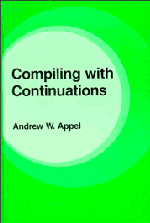
-
Select format
-
- Publisher:
- Cambridge University Press
- Publication date:
- 15 December 2009
- 29 November 1991
- ISBN:
- 9780511609619
- 9780521033114
- Dimensions:
- Weight & Pages:
- Dimensions:
- (247 x 174 mm)
- Weight & Pages:
- 0.436kg, 272 Pages
You may already have access via personal or institutional login
Book description
The control and data flow of a program can be represented using continuations, a concept from denotational semantics that has practical application in real compilers. This book shows how continuation-passing style is used as an intermediate representation on which to perform optimisations and program transformations. Continuations can be used to compile most programming languages. The method is illustrated in a compiler for the programming language Standard ML. However, prior knowledge of ML is not necessary, as the author carefully explains each concept as it arises. This is the first book to show how concepts from the theory of programming languages can be applied to the producton of practical optimising compilers for modern languages like ML. This book will be essential reading for compiler writers in both industry and academe, as well as for students and researchers in programming language theory.
Reviews
"I recommend the book to language designers and implementors specializing in the functional paradigm." F.G. Pagan, Computing Reviews
Contents
Metrics
Altmetric attention score
Full text views
Full text views help Loading metrics...
Loading metrics...
* Views captured on Cambridge Core between #date#. This data will be updated every 24 hours.
Usage data cannot currently be displayed.
Accessibility standard: Unknown
Why this information is here
This section outlines the accessibility features of this content - including support for screen readers, full keyboard navigation and high-contrast display options. This may not be relevant for you.
Accessibility Information
Accessibility compliance for the PDF of this book is currently unknown and may be updated in the future.


